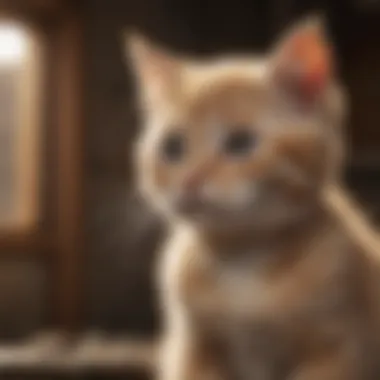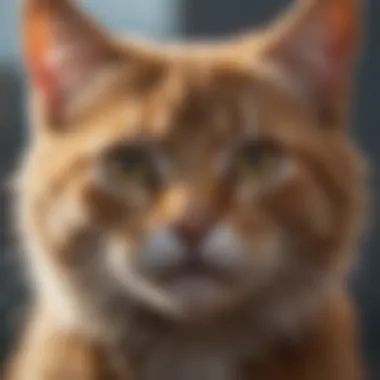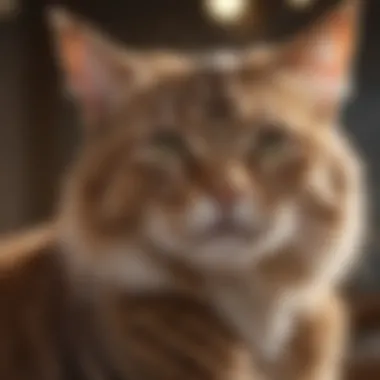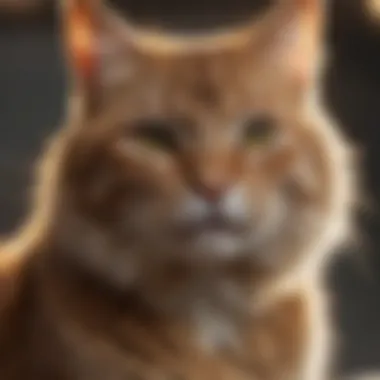Optimizing Cat Vaccination Schedule for Different Life Stages


Pet Care Essentials
In the realm of feline healthcare, ensuring your cat's vaccination schedule is tailored to its age is paramount. From kittenhood through to the senior years, vaccines play a crucial role in safeguarding your beloved pet's health and well-being. Establishing a comprehensive vaccination plan requires an understanding of the feline immune system's development and how it correlates with age. By delving into this intricate interplay between age and vaccines, pet owners can make informed decisions that pave the way for optimal protection against prevalent diseases.
When formulating a vaccination schedule, the frequency and timing of vaccines are vital considerations that vary according to the cat's age. Kittens require a series of core vaccinations to build their immunity against common diseases such as feline distemper, calicivirus, and rhinotracheitis. These initial vaccinations often commence when kittens are around eight weeks old and may necessitate booster shots to reinforce their immunity. As cats transition into adulthood, their vaccination needs evolve, with booster shots scheduled periodically to ensure ongoing protection. For senior cats, vaccination requirements may differ, reflecting age-related changes in the immune system and potential health concerns. Tailoring the vaccination schedule to address these age-specific considerations is key to promoting a lifetime of good health for your feline companion.
Understanding the rationale behind age-specific vaccination schedules elucidates the significance of timing in ensuring efficacy and protection. Vaccines stimulate the immune system to produce antibodies that defend against specific diseases. Administering vaccines at the optimal age intervals maximizes the immune response, bolstering your cat's defenses against potential pathogens. By adhering to a customized vaccination timeline based on age, pet owners can mitigate the risk of preventable diseases and contribute to their cat's wellness and longevity.
Behavior & Training
Moving beyond the realm of healthcare, understanding your cat's behavior and training needs is intrinsic to fostering a harmonious relationship. Body language serves as a cornerstone of feline communication, offering insights into your cat's emotions, intentions, and overall well-being. Recognizing subtle cues like tail flicks, ear positions, and vocalizations empowers pet owners to decode their cat's messages and respond attentively. Building a solid foundation of communication through body language awareness enhances the bond between you and your feline companion, cultivating trust and mutual understanding.
Basic training techniques play a pivotal role in shaping your cat's behavior and addressing common challenges encountered in a household setting. Positive reinforcement, consistency, and patience are fundamental principles that underpin successful training endeavors. Whether it's litter box training, leash walking, or discouraging unwanted behaviors, employing positive reinforcement techniques can motivate your cat to learn and adapt effectively. By nurturing a positive learning environment and rewarding desirable behaviors, pet owners can cultivate a well-mannered and responsive companion.
Navigating behavioral concerns in cats demands a holistic approach that considers underlying triggers and environmental factors. Issues like aggression, anxiety, or excessive grooming may stem from stress, fear, or unresolved health issues. Implementing enriching activities, providing mental stimulation, and creating a conducive living environment are strategies to address behavioral challenges proactively. Consultation with a veterinarian or a certified animal behaviorist can offer valuable insights and tailored solutions to support your cat's emotional and behavioral well-being.
Socialization is an integral component of a cat's development, influencing their confidence, adaptability, and social skills. Early exposure to varied stimuli, experiences, and interactions paves the way for a well-adjusted and sociable cat. Introducing your cat to new people, pets, and environments in a gradual and positive manner fosters resilience and reduces the likelihood of fear-based behaviors. Incorporating socialization activities into your cat's routine nurtures a well-rounded temperament and promotes their overall mental and emotional health.
Pet Home Environment
Designing a pet-friendly living space entails creating a sanctuary that accommodates your cat's physical and psychological needs. Providing ample space for exercise, exploration, and vertical territory enhances your cat's quality of life and overall well-being. Enriching your home environment with scratching posts, climbing structures, and interactive toys not only satisfies your cat's natural instincts but also promotes physical activity and mental stimulation. Crafting a stimulating and dynamic environment fosters a sense of security and happiness for your feline companion.
Safety measures and hazard avoidance are essential components of maintaining a secure home environment for your cat. Identifying and mitigating potential risks such as toxic plants, household chemicals, and sharp objects safeguards your cat from preventable accidents or injuries. Creating designated safe zones, utilizing pet gates, and securing windows and balconies are proactive measures to prevent falls or escape attempts. Implementing these safety protocols ensures a protected and nurturing space where your cat can thrive and feel secure.
Selecting the right toys and accessories tailored to your cat's preferences and play style enhances their engagement and mental stimulation. Toys that encourage interactive play, mimic prey behavior, or offer sensory enrichment captivate your cat's interest and promote physical exercise. Rotation of toys, introduction of puzzles or treat-dispensing gadgets, and incorporating scratching surfaces cater to your cat's diverse needs and innate behaviors. By curating a selection of engaging toys and accessories, pet owners can nurture their cat's natural behaviors and provide opportunities for play, exploration, and relaxation.
Establishing a comfortable resting area is essential to meet your cat's relaxation and comfort needs. Cats are crepuscular creatures who value cozy and secure resting spots where they can retreat and recharge. Providing soft bedding, secluded nooks, or elevated perches affords your cat options for restorative rest and relaxation. Creating a tranquil and inviting resting area caters to your feline companion's instinctual nesting behavior and cultivates a sense of belonging and comfort within your home.
Pet Health Issues
Vigilance in recognizing subtle signs of illness is crucial for safeguarding your cat's health and intervening promptly when necessary. Monitoring changes in appetite, water intake, litter box habits, or behavior patterns enables early detection of potential health concerns. Regular health and wellness check-ins with your veterinarian facilitate preventive care measures and early interventions to maintain your cat's optimal health.
Preventive care encompasses a spectrum of practices aimed at averting illnesses and promoting your cat's well-being. Vaccinations, parasite control, dental care, and tailored nutrition are pillars of preventive healthcare that contribute to your cat's longevity and quality of life. Scheduling routine check-ups, vaccinations, and screenings in alignment with your cat's age and lifestyle factors establishes a proactive healthcare routine that prioritizes prevention and early detection.
Common ailments such as dental disease, obesity, or respiratory infections are prevalent health issues that may impact your cat's well-being. Understanding the risk factors, symptoms, and treatment modalities for these conditions empowers pet owners to address them effectively. Incorporating preventive measures such as dental hygiene practices, weight management strategies, and environmental enrichment minimizes the risk of common ailments and supports your cat's overall health and vitality.
Emergency preparedness is a critical aspect of pet healthcare that necessitates planning and proactive measures. Creating a comprehensive emergency kit, assembling essential supplies, and familiarizing yourself with emergency protocols are prudent steps to take. In unforeseen situations such as natural disasters, medical emergencies, or accidents, being prepared ensures swift and effective response to safeguard your cat's health and well-being. By prioritizing emergency preparedness, pet owners can mitigate risks and handle challenging situations with composure and readiness.
Synthesizing the information presented throughout, optimizing your cat's vaccination schedule based on age is a multifaceted endeavor that combines scientific knowledge with attentive care. From understanding the nuances of vaccination timing to cultivating a supportive home environment and prioritizing preventive health measures, every aspect contributes to your cat's overall well-being. By embarking on this journey of feline healthcare with diligence, compassion, and informed decision-making, pet owners can nurture a thriving partnership with their beloved feline companions.
Introduction


The discourse surrounding the optimization of a cat's vaccination schedule based on its age is a paramount subject requiring careful consideration and in-depth understanding. This topic delves into the intricate balance between timing and frequency of vaccines to ensure the utmost protection for feline companions. By elucidating the nuances of cat vaccination at distinct life stages, pet owners are empowered to make judicious decisions concerning their cat's health and overall well-being.
Significance of Cat Vaccination
Nurturing a Healthy Feline
Navigating the realm of 'Nurturing a Healthy Feline' within the context of cat vaccination evinces a critical element of holistic pet care. This facet emphasizes the proactive measures pet owners undertake to fortify their feline friend's immune defenses against potential pathogens and diseases. 'Nurturing a Healthy Feline' stands as a cornerstone of preventive healthcare, aiding in averting various health concerns that may beset cats. The distinctiveness of 'Nurturing a Healthy Feline' lies in its proactive approach, offering a shield that fortifies the feline constitution against ailments that could compromise its well-being.
Preventing Disease Transmission
The aspect of 'Preventing Disease Transmission' within the sphere of cat vaccination carries profound implications for feline welfare. It underscores the pivotal role vaccines play in curbing the spread of contagious diseases among feline populations. 'Preventing Disease Transmission' stands out as a vital choice in bolstering community immunity and shielding vulnerable cats from infectious agents. Its uniqueness lies in the collective protection it affords, inhibiting the proliferation of diseases within cat communities and ensuring a safer environment for all felines.
Legal Regulations and Obligations
Delving into 'Legal Regulations and Obligations' concerning cat vaccination illuminates the regulatory framework that governs pet healthcare. This facet underscores the legislative mandates and ethical responsibilities incumbent upon pet owners to uphold vaccination practices. 'Legal Regulations and Obligations' serve as a guiding principle, ensuring compliance with health standards and contributing to a collective effort to mitigate disease spread. Its distinctive feature lies in the harmonization of legal dictates with pet care practices, establishing a structured approach that safeguards both individual pets and the larger feline population.
Purpose of the Article
Guiding Cat Owners
The crux of 'Guiding Cat Owners' in this narrative aligns with empowering pet owners to navigate the intricate landscape of cat vaccination schedules effectively. It serves as a beacon of knowledge, offering insights and guidance on making informed decisions that resonate with the health and well-being of feline companions. 'Guiding Cat Owners' brings forth a trove of information that equips pet owners with the tools needed to chart a course of preventive care that is tailored to their cat's individual needs.
Empowering Informed Decisions
The essence of 'Empowering Informed Decisions' encapsulates the ethos of informed pet ownership and healthcare advocacy. It empowers pet owners to partake in decision-making processes rooted in knowledge and understanding, fostering a sense of agency concerning their cat's health. 'Empowering Informed Decisions' stands as a bridge between information and action, elevating the discourse on cat vaccination to one driven by prudence and discernment.
Promoting Feline Well-being
The advocacy for 'Promoting Feline Well-being' underscores a holistic approach to cat care that extends beyond the realm of vaccination. It shines a spotlight on the interconnected facets of feline health, emphasizing the symbiotic relationship between vaccination, nutrition, and overall welfare. 'Promoting Feline Well-being' champions a philosophy of comprehensive care that aims to optimize the quality of life for feline companions, transcending mere protection to fostering enduring health and vitality.
Cat Vaccination Basics
In exploring the realm of cat vaccination basics within the context of this article, we delve into foundational principles crucial for understanding the intricate world of feline immunization. These basics form the backbone of safeguarding your beloved pet against various diseases and health risks. By focusing on cat vaccination basics, we illuminate the significance of establishing a sturdy shield of protection for your feline companion throughout its life stages. Understanding the core concepts of cat vaccination basics equips pet owners with the knowledge required to make informed decisions, promoting their cat's overall health and well-being.
Understanding Vaccines
Types of Cat Vaccines
Exploring the diverse landscape of cat vaccines, we encounter a myriad of options designed to fortify your cat's immune system against potential threats. Each type of cat vaccine offers a distinctive set of protections tailored to specific diseases or viruses, emphasizing preventive care for feline health. The variability in types of cat vaccines allows for a customized approach to address your cat's individual immunological needs, enhancing its resilience in the face of microbial challenges.
Mechanism of Action


Delving into the intricate workings of vaccine mechanisms, we unravel the sophisticated processes through which vaccines bolster the immune response in felines. Understanding the mechanism of action elucidates how vaccines stimulate the body's defenses, preparing it to recognize and combat pathogens efficiently. By comprehending the mechanistic underpinnings of vaccines, pet owners can appreciate the biological complexities involved in safeguarding their cat's well-being.
Immunization Duration
Examining the temporal aspects of immunization duration, we confront the importance of timing in maintaining effective immunity for felines. Immunization duration dictates the longevity of protection conferred by vaccines, influencing the frequency of booster shots necessary to sustain immunity. By grasping the implications of immunization duration, pet owners can ensure timely revaccination to safeguard their cat's health optimally.
Common Cat Vaccinations
Rabies Vaccine
Diving into the realm of the rabies vaccine, we encounter a crucial immunization tool mandated by legal regulations to protect both felines and humans from this deadly viral disease. The rabies vaccine stands out for its unparalleled efficacy in preventing rabies transmission, making it an indispensable component of feline vaccination protocols. Understanding the unique attributes of the rabies vaccine empowers pet owners to prioritize this vital immunization to safeguard their cat's well-being.
FVRCP Vaccine
In exploring the facets of the FVRCP vaccine, we unravel a comprehensive blend of protections against feline viral infections, including calicivirus, herpesvirus, and panleukopenia. The FVRCP vaccine boasts a versatile shield of immunity, guarding against a spectrum of viral threats prevalent in cat populations. Appreciating the multifaceted coverage of the FVRCP vaccine enables pet owners to adopt a holistic approach to feline immunization, bolstering their cat's defenses against common viral pathogens.
Feline Leukemia Vaccine
Venturing into the realm of the feline leukemia vaccine, we confront a pivotal tool in combating the spread of feline leukemia virus among susceptible cat populations. The feline leukemia vaccine offers a targeted defense against this potentially fatal retrovirus, shielding felines from the devastating effects of leukemia-related diseases. Recognizing the unique benefits of the feline leukemia vaccine encourages pet owners to prioritize this specific immunization, safeguarding their cat's health and longevity.
Cat Vaccination Schedule by Age
In the realm of feline healthcare, one of the paramount considerations revolves around optimizing the cat vaccination schedule based on age. Understanding when and which vaccines are essential for different life stages of a cat is crucial for ensuring the sustained well-being of our feline companions. By tailoring vaccination schedules according to age, pet owners can proactively safeguard their cats from prevalent diseases and health risks, ultimately fostering a healthy and thriving feline population.
Kitten Vaccination
For kittens, the initial vaccines play a pivotal role in establishing a robust immune foundation for their future health. These initial vaccines, administered during the early stages of a kitten's life, provide crucial protection against common feline diseases. Boosters and follow-ups, on the other hand, serve to fortify this immunity over time, ensuring long-term resilience against potential threats. Socialization importance in kitten vaccination cannot be overstated. It not only aids in their overall development but also minimizes the risk of behavioral issues in adulthood, emphasizing the significance of early socialization in a kitten's life.
Adult Cat Vaccination
When it comes to adult cat vaccination, considering lifestyle factors is paramount. Tailoring vaccination plans to suit the specific lifestyle of the cat, whether indoor or outdoor, helps in mitigating risks effectively. Customized vaccination schedules address the unique needs of each cat, optimizing their protection based on individual circumstances. Annual revaccination acts as a crucial reinforcement, ensuring that the cat's immunity remains strong and resilient against evolving health threats.
Senior Cat Vaccination
Senior cats require specialized attention due to aging and potential immunocompromised systems. Addressing these issues through tailored vaccination strategies helps in bolstering their weakened immune responses, safeguarding them against age-related health complications. Focusing on specific diseases that commonly affect senior cats enables targeted protection, enhancing their quality of life significantly. Quality of life enhancement through vaccination plays a vital role in ensuring that senior cats enjoy their golden years with minimal health concerns.
Factors Influencing Vaccination Decisions
When considering the vaccination of your beloved feline companion, several crucial factors come into play, influencing the overall decision-making process. Understanding the impact of these factors is paramount in ensuring the health and well-being of your cat. Factors such as the health status of your cat and their environmental exposure play a pivotal role in determining the most appropriate vaccination schedule for your pet.
Health Status


A cat's health status is a fundamental consideration when deciding on vaccination protocols. It encompasses various aspects that directly affect the effectiveness of vaccines and the overall immune response of the feline. Pre-existing conditions in cats can significantly impact their ability to respond to vaccines optimally, making it essential to tailor vaccination plans accordingly.
Pre-existing Conditions
Pre-existing conditions in cats can range from chronic illnesses to previous infections that may weaken their immune system. Cats with pre-existing conditions require special care and attention when it comes to vaccinations to ensure their safety and prevent any potential complications. Understanding the specific health challenges your cat faces is vital in designing a vaccination schedule that meets their individual needs.
Immune Response Evaluation
Evaluating your cat's immune response to vaccinations is critical in gauging their level of protection against common feline diseases. A thorough assessment of how your cat reacts to vaccines can help veterinarians customize vaccination plans to maximize their effectiveness. Monitoring your cat's immune response over time allows for adjustments to be made to vaccination schedules as needed.
Veterinary Consultation
Seeking advice from a qualified veterinarian is indispensable when making vaccination decisions for your cat. Veterinarians offer expert guidance on tailoring vaccination schedules based on your cat's health status and lifestyle factors. Their professional insights ensure that your cat receives the most appropriate vaccines at the right intervals, promoting optimal immunity and well-being.
Environmental Exposure
The environment in which your cat lives plays a significant role in determining their exposure to potential diseases. Factors such as whether your cat is predominantly indoors or ventures outdoors, the dynamics of a multi-pet household, and geographical considerations all influence the risk of disease transmission and the necessity for specific vaccines.
Indoor vs. Outdoor Risks
Indoor cats face different health risks compared to those that roam outdoors. Indoor cats are generally less exposed to infectious agents but may still require protection against certain diseases. Understanding the distinct risks indoor cats face helps in formulating targeted vaccination strategies to address their unique needs.
Multi-Pet Household Dynamics
Living in a multi-pet household can introduce additional complexities in managing your cat's health. Interactions with other pets increase the likelihood of disease spread, emphasizing the importance of vaccination in preventing outbreaks within the household. Considering the dynamics between pets aids in creating a comprehensive vaccination plan that protects all animals.
Geographical Considerations
Geographical location plays a crucial role in determining the specific diseases your cat may be exposed to. Regions with higher incidences of certain illnesses require tailored vaccination approaches to safeguard your cat's health. Taking into account the prevalent diseases in your area enables you to prioritize vaccines that offer the most protection against local threats.
Conclusion
The [Conclusion] section of this article serves as a vital component in understanding the optimal vaccination schedule based on the age of a cat. By synthesizing the essential information presented throughout the article, cat owners can grasp the significance of tailoring vaccination plans to different life stages. This section consolidates the key points discussed, emphasizing the critical role of timing and frequency in ensuring maximum protection for feline companions. Addressing the importance of informed decision-making, feline health advocacy, and promoting optimal well-being, the Conclusion encapsulates the overarching themes and benefits of optimizing cat vaccination schedules.
Empowering Cat Owners
Informed Decision-making
In exploring the realm of Informed Decision-making within the context of cat vaccinations, it becomes apparent that a meticulous approach is imperative. This facet plays a pivotal role in guiding cat owners towards making educated choices regarding their pet's health and well-being. The key characteristic of Informed Decision-making lies in its ability to fuse scientific information with individual circumstances, providing a tailored approach that optimizes feline care. By integrating evidence-based practices and considering the unique needs of each cat, Informed Decision-making emerges as a valuable strategy for promoting optimal health outcomes.
Feline Health Advocacy
Embracing Feline Health Advocacy within the framework of cat vaccination schedules unveils a commitment to advancing feline welfare. This aspect underscores the significance of actively championing for the well-being of cats through comprehensive vaccination strategies. The primary characteristic of Feline Health Advocacy is its inherent drive to prioritize preventative care, aiming to safeguard cats from potential health threats. Through its focus on proactive measures and health maintenance, Feline Health Advocacy emerges as a cornerstone in ensuring the longevity and vitality of feline companions.
Optimal Well-being
The concept of Optimal Well-being serves as a beacon for cat owners seeking to elevate the standard of care for their pets. Its key characteristic lies in fostering a holistic approach that considers not only physical health but also emotional and psychological aspects. By embracing Optimal Well-being in the context of vaccination schedules, cat owners can align their efforts towards promoting comprehensive wellness for their feline companions. While advocating for preventive measures and individualized care, Optimal Well-being sets the stage for cultivating a thriving environment that supports the overall health and happiness of cats.







